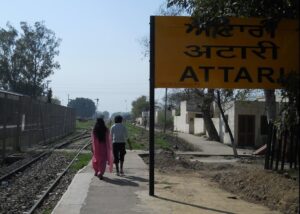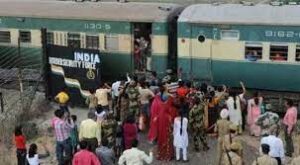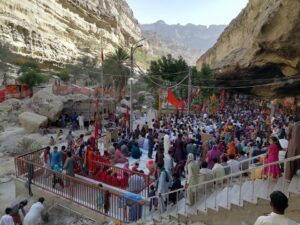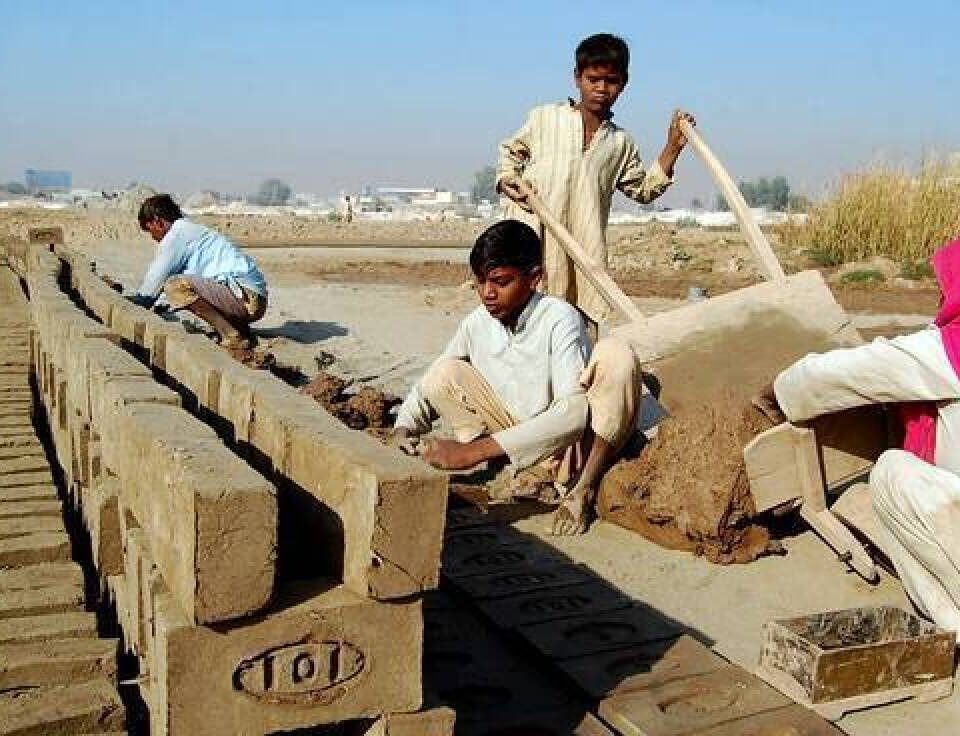Suspended Thar Train Express Halts Pilgrimages, Loved Ones Meeting

Female Cotton Workers Face Daily Harassment, Health Challenges for Meager Wages
October 3, 2023
Charging Ahead: The Electric Revolution in Eco-Friendly Transportation
November 14, 2023Suspended Thar Train Express Halts Pilgrimages, Loved Ones Meeting
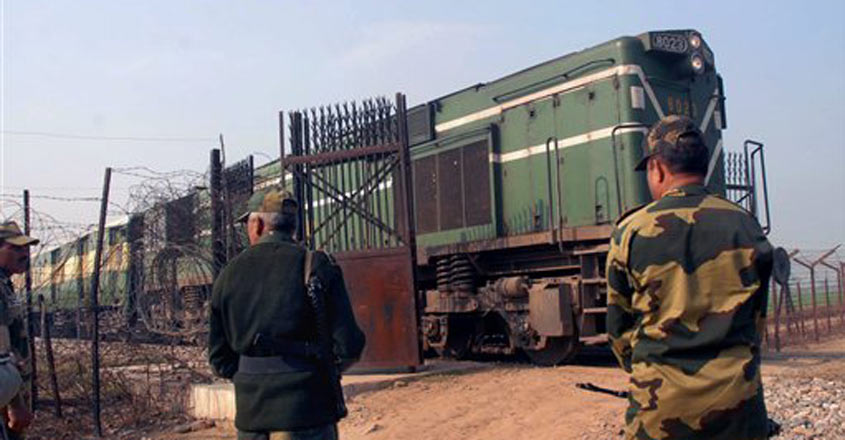
(Rana Malhi)
Dileep Kumar from Sindh was very happy and excited to share the good news of the birth of his first daughter with his uncle. Carrying the newborn in his lap, he uses his cell phone to make a video call to his uncle who lives in the Indian city of Jodhpur. His uncle answers and both have a chat and exchange greetings.
Dileep, who is 35 years old, works as an accountant in a local pharmaceutical company in Pakistan’s southern desert city of Umerkot, which is approximately 300 km from the port city of Karachi.
Speaking to us with despair in his voice, Kumar said, I wish my uncle could visit us on the occasion of my daughter’s birth. But after the Thar Express closure, there is no easy and cheap option for his uncle to visit Pakistan.
“I was eight years old when my uncle migrated with his entire family from Pakistan to India. For the past twenty-seven years, we have not met. The advent of Internet has brought us some hope and solace. At least, we can see each other on video call,” he said.
Since the Partition in 1947, political and diplomatic tensions between the two countries are common and continue for long periods. Due to this, the people in both countries face difficulties.
During the partition, many Hindus from Sindh migrated from Pakistan to India, while many Muslims migrated from India and settled in the urban areas of Sindh. Many of the migrants who settled in Sindh, call themselves Muhajir.
Even today, many relatives of Hindus like Kumar, are living across the border, and cannot meet their loved ones after the suspension of Thar Express.
The Thar Express used to ply between India and Pakistan when political tensions between the two countries weren’t at such a high pitch. It connected Jodhpur in Rajasthan, India, with Karachi in Sindh, Pakistan, via the Munabao border to Khokhrapar, a small hamlet.
Khokhrapar is located in Tharparkar district of Sindh province in Pakistan. It is situated near the international border between India and Pakistan. On the Indian side of the border, is Munabao, located in Barmer district of Rajasthan state. The train journey is approximately 1,070 kilometers (665 miles) and serves as a crucial rail link between the two countries.
Thar Express service was suspended indefinitely in 2019 due to rising tensions between India and Pakistan. The Pakistan government decided to halt the train service as a response to the revocation of the special status of Indian-administered Jammu and Kashmir, which led to heightened tensions between both countries.
The Thar Express resumed operations in 2006 after a gap of 41 years following the 1965 war as a part of the efforts to improve people-to-people contact and trade between India and Pakistan. It was an important train service for families and communities that were divided during partition in 1947.
“Four years ago we made our passports to visit my uncle and perform the Haridwar yatra, but we could not afford to visit India via Wagah-Attari border because it is far from Umerkot and expensive. Only Thar Express is cheap, convenient and easy commute for us,” Kumar said.
Millions of Sindhi Hindus hope and fervently pray that if Thar Express resumes service, they can meet their loved ones and perform their religious rituals.
Kirpal Das, who lives in Samaro town of Umerkot district, applied for a pilgrim visa last month along with his mother father but unfortunately he did not got visa.
“Before the death of my parents, I want to perform Haridwar yatra in India with my parents but the Indian embassy is not issuing us visa. Hundreds of our relatives had applied for visa but they did not got visa so far”, Das added hopelessly.
According to the 2017 census, approximately 7 million non-Muslims live in Pakistan, of which 3.6 million are Hindus, and many Hindus live in Sindh and near the Khokhrapar border. Usually, the demand for restoration of Thar Express comes from this region’s Hindu community. To get more information about whether any discussion took place regarding this issue in Pakistan’s parliament, we approached Pakistan Tehreek-e-Insaf minority former member of the National Assembly from Umerkot, Lal Chand Malhi.
Speaking to us, Malhi said that in 2021 he had raised his voice in the National Assembly regarding restoration of the Thar Express, and all members of the National Assembly from Sindh had supported him.
“When Kartarpur corridor can be opened for Sikhs pilgrims of India, why can’t the Thar Express be opened for millions of Hindus living in Sindh?” he questioned.
Thar Express was carrying 700 passengers on weekly basis from Karachi via Hyderabad and Mirpurkhas train stations. It was an easy and very cheap commute for Hindus especially those living near the Indian border ie Umerkot, Tharparkar, Mirpurkhas, Sanghar, Hyderabad and other nearby cities.
“Thousands of Hindus want to perform Haridwar yatra and also meet their relatives, and they cannot afford to go via Wagah border. Further, India should grant them pilgrim visa too,” Malhi added.
The Thar Express train is essential not only for the Hindus living in Sindh but also for Muhajirs who migrated from India and are now living in the urban areas of Sindh.
Speaking to this scribe, former Sindh Assembly member from Muttahida Qaumi Movement Pakistan Mangala Sharma says Thar Express is essential for Muhajirs as well as the Hindus living in Sindh. For the Muhajirs who settled and living in Sindh, many of their siblings and other close relatives still live in India and they also are keen to meet their loved ones.
“Those affected feel the most; they left everything and came to Pakistan, but their blood relatives still live in India and want to meet each other,” she said.
Pakistan is also home to several holy places that hold significant religious importance for
Hindus, i.e., Hinglaj Mata Temple in the Hingol National Park in Balochistan province, Shiv Mandir in the Umerkot district of Sindh province, Sadh Belo Temple located in Sukkur, Sindh province.
Dr Jaipal Chhabria, a member of the Minority Commission of Pakistan, says that the problem of Kashmir should be resolved. Due to this, common people are suffering a lot, and there is an unnecessary hatred between our two countriesthat can be quickly resolvex
He further said that he had demanded in his commission that a Hindu be made the Kashmir
Committee chairman. The Kashmir issue would be resolved because, after the formation of Pakistan, Quaid-e-Azam Muhammad Ali Jinnah also appointed a Hindu as the chairman of the Kashmir Committee who was Jogenderanath Mandal.
Dr Chhabria also urged the government that Hindus living in other countries, including India, get visa for Pakistan to visit the Hindu temples of Hinglaj Mata, Sadhu Bela, and other religious places to perform their religious rituals in Pakistan.




